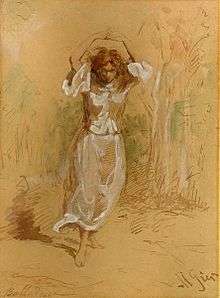Balladyna (drama)

Balladyna is a tragedy written by Juliusz Słowacki in 1834 and published in 1839 in Paris. It is a notable work of Polish romanticism, focusing on the issues such as thirst for power and evolution of the criminal mind. The story revolves around the rise and fall of Balladyna, a fictional Slavic queen."
Power and ethics in tragedy
Balladyna had been compared to Macbeth, dramas which show how evil and prone to suggestion human nature is. The author claims that it is impossible to righteously reign the country if the power was gained unlawfully.[1]
Plot
Balladyna and Alina are sisters who live with their mother in a poor hut in the middle of a forest. A nymph Goplana – the queen of the Goplo Lake - is in love with Balladyna’s beloved, Grabiec, and because of her jealousy she intervenes in peoples' lives and changes their destiny. To the sisters’ hut comes a rich prince Kirkor, who was led there by Skierka, Goplana’s servant. Goplana wanted Kirkor to fall in love with Balladyna so that Grabiec could be just hers, however Skierka made a mistake and Kirkor fell in love not only with Balladyna, but also Alina.
In order to get a husband, the sisters compete with each other in collecting raspberries; the one who fills a pitcher first will marry Kirkor. When Balladyna finds out that Alina is winning, she kills her with a knife. The only witness to that is Grabiec, whom Goplana turns into a weeping willow so that he wouldn’t tell anyone about the murder. After coming back home Balladyna claims that her sister ran away with a lover. The only things reminding Ballasyna of the crime she committed is a bloody stain on her forehead that cannot be removed, pangs of remorse and terrible nightmares. The body of the dead girl is found by Filon who falls in love with her.
Soon after the marriage Kirkor leaves for the battle of Gniezno and wedding guests come to the castle. Balladyna is so ashamed of her mother that she orders the servants to close her in a tower. During Kirkor’s absence, Balladyna and Kirkor's knight, Fon Kostryn, are falling for each other. That’s when Balladyna decides to go to a hermit hoping that he will remove the bloody stain. The hermit can read people like no one else and soon finds out about Balladyna’s deeds. Kostryn is a witness to this scene but to prove his loyalty to Balladyna he aids her in killing a messenger sent by Kirkor with presents for his wife.
In the castle a feast takes place where, among others, the guests are: Grabiec (disguised as a bell king), and nymphs Skierka and Chochlik. Balladyna disavows her mother and exiles her from the castle. When hearing Chochlik's song telling about her felonies, Balladyna goes mad. She hears voices from the beyond and sees the ghost of her sister and finally passes out. In the middle of the night Balladyna and Kostryn kill Grabiec and take his crown – the symbol of a legitimate royal rule – and leave for Gniezno to seize power.
Fon Kostryn defeats Kirkor’s army in battle and Kirkor himself dies on the battlefield. Soon after the battle Balladyna gets rid of Kostryn by giving him a piece of bread sliced with a poisoned knife. Kostryn dies in agony, warning against Balladyna's rule with his dying breath.
Balladyna becomes the queen. The chancellor informs her that as a new monarch she should decide on some of the cases pleaded by her subjects. The first case concerns the poisoning of Kostryn and Balladyna is forced to sentence an unknown man for death. The next case regards the death of Alina and another unknown and innocent man is sentenced for death.
At that moment Balladyna’s mother enters the palace, blinded by the lightning and complaining about her daughter who drove her out of the castle during the storm and who refused to have anything to do with her. She doesn’t want to reveal her name so she’s killed during torture. We know, however, that the infamous daughter was Balladyna, who forced by the chancellor passes a sentence for the daughter and for the third time the sentence is death. The triple punishment on Balladyna is carried out by God himself, who strikes the evil queen with a lightning, killing her.
References
Sources
- Balladyna by Juliusz Słowacki